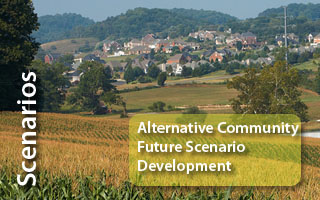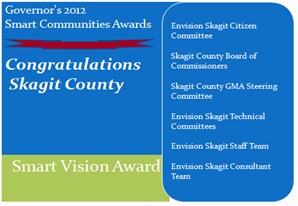
Alternative Futuring is the process of projecting, using best available models, scenarios of future change. Common Futures specializes in applying state-of-the-art landscape change models to developing alternative future scenario models in a variety of domains: urban growth and development, forest landscape dynamics, climate impacts on wildfire and similar phenomena, habitat and invasive species spread models, water resources analyses, and ecosystem service evaluations, to name a few.
We use a state-of-the-art GIS-based tool, Envision, to:
The outcome of this process is a set of maps (GIS coverages) reflecting trajectories of change, expressed in a variety of representations (for example land use, land cover, zoning, water use) - customized to your specific needs, and a series of outcome metrics that reflect how well a given scenario acheives your planning goals.
A Frequently Asked Questions About Alternative Future Scenarios document is available here.
Accomodating urban growth, protecting valuable natural resources, and engaging the public called for a robust community planning process that could bring together relevant data, capture community priorities, and project effects of alternative growth management strategies on a variety of community economic, social and ecological indicators.
Common Futures scientists worked with Skagit County, WA planners to model four alternative scenarios using a community stakehlder process, producing a rich set of maps both informd by and informing the stakeholder process.
The creation, via the stakeholder process, of a "Preferred" scenario agreed upon by all stakeholders, that captured a set of policies reflecting a variety of perspectives. The Envision Skagit 2060 team won the Govenor's Smart Communities Award in 2012.
